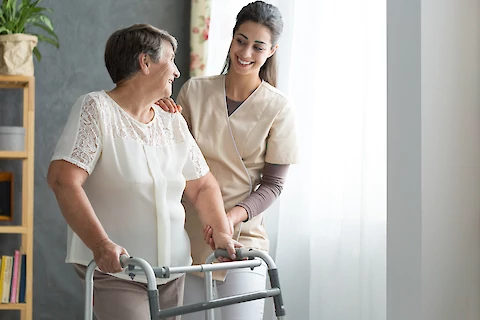
A common condition that often affects seniors is osteoporosis - a weakening of the bones that can lead to fractures and other complications. If you have a senior family member with osteoporosis, you'll need to understand the condition and learn practical ways to help them manage it.
In this blog post, we'll provide you with helpful information about osteoporosis and share strategies to help them live fuller lives.
Understanding Osteoporosis
Osteoporosis is a condition in which the bones become weak and brittle, making them more susceptible to fractures. This occurs when the body loses too much bone or doesn't produce enough new bone to replace the lost bone. Several factors, such as age, genetics, hormonal changes, and low calcium intake, can contribute to the development of osteoporosis.
Symptoms may not be apparent until a fracture occurs, which can lead to pain, decreased mobility, and even a loss of independence. Therefore, early detection and appropriate management are essential in preventing complications and maintaining a good quality of life for seniors.
Creating a Safe Home Environment
Ensuring the home environment is safe for seniors with osteoporosis is vital in preventing falls and subsequent fractures. Start by identifying potential hazards, such as uneven flooring, clutter, or inadequate lighting. To address these issues, consider installing grab bars and handrails in areas like the bathroom and stairs, removing or securing loose rugs, and providing sufficient lighting, especially in hallways and at night. With these, you'll create a safer living space for your loved one.
Promoting Proper Nutrition
A balanced diet rich in key nutrients is essential for maintaining bone health and managing osteoporosis. Some of the most critical nutrients include calcium, vitamin D, magnesium, and vitamin K. Calcium is necessary for strong bones, while vitamin D helps the body absorb calcium efficiently. Magnesium and vitamin K both contribute to bone health and structure.
To incorporate these nutrients into a senior's diet, encourage them to eat foods like dairy products, leafy greens, fish, and fortified cereals. In some cases, a healthcare professional may recommend supplements to ensure adequate nutrient intake.
Assisting Seniors in Daily Activities
Maintaining independence and mobility is crucial for seniors living with osteoporosis. When offering assistance, it's essential to do so in a gentle and supportive manner. Learn how to help them get around without seeming too overbearing. And always ask if they need help with something.
You can also encourage the use of assistive devices, such as walkers or canes, to help maintain mobility while reducing the risk of falls.
Providing emotional support and encouragement can also make a significant difference in your loved one's well-being.
Exercise for Osteoporosis Patients
Regular exercise offers numerous benefits for seniors with osteoporosis, including improved strength, balance, and bone density. Suitable exercises for osteoporosis patients include weight-bearing activities, muscle-strengthening exercises, and balance and flexibility exercises.
Weight-bearing exercises, such as walking or dancing, can help maintain bone density, while muscle-strengthening exercises, like resistance training, can improve overall strength and reduce the risk of falls. Balance and flexibility exercises, such as tai chi or yoga, can also help prevent falls by improving stability and coordination.
Before beginning any exercise routine, consult with a healthcare professional to ensure the activities are safe and appropriate for your loved one. Start slow and gradually increase the intensity as their strength and confidence grow. Ensuring proper form and technique is also crucial in avoiding injury.
Get Senior Care and Assistance Today
Managing osteoporosis in senior family members involves understanding the condition, creating a safe home environment, promoting proper nutrition, safely assisting them in daily activities, and encouraging suitable exercises. By implementing these strategies, you can help your senior loved one maintain their independence and quality of life.
If you live in Charlottesville, Harrisonburg, Elkton, Bridgewater, Gordonsville, or Crozet and need support in caring for a loved one with osteoporosis, contact Senior Helpers Blue Ridge. Our compassionate and experienced team is here to provide the help you need.